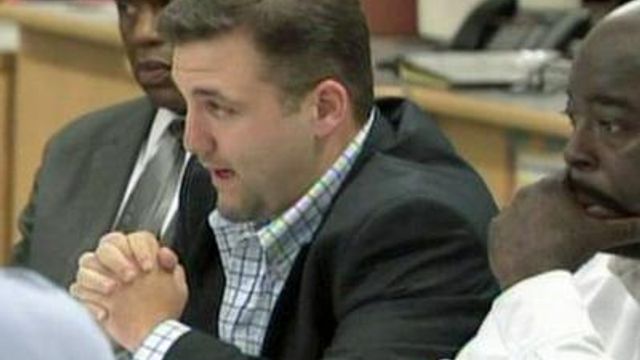Wake schools task force targets students from poor families
Driven by what school board member and co-chair John Tedesco calls "a commitment to our most vulnerable children," the Economically Disadvantaged Student Task Force held its first meeting of three dozen people.
Posted — UpdatedYour browser doesn't support HTML5 video.
The task force is officially a school board committee with three board members and more than 30 invited community members. Member John Tedesco, the driving force behind the school system's new policy of seeking community-based school assignments and not trying for economic diversity in every school, co-chairs the panel.
Your browser doesn't support HTML5 video.
The other chair is board member Keith Sutton, who has been on the losing side in a series of 5-4 votes on the way to changing the assignment policy.
Thursday, Tedesco ran the meeting as Sutton sat silently next to him.
The meeting included a round-table discussion about what "success" would look like for economically disadvantaged students, but some tough comments came after that.
"We've got to embrace, this county, equity, not equality," Marvin Pittman, a former state Board of Education member, told Tedesco.
That will be a hard discussion, Pittman explained, because he means devoting extra resources to underachieving students who need help.
"It may look," he predicted, like the school board would be taking resources away from other schools and students.
Tedesco said the task force's recommendations for the school system will go "straight to the board table," but he stressed that the wider community has to help, too.
"We've been attacking some of these problems for decades" without success, he said. In some cases, he told the group, the school system spends $500,000 to $600,000 more on under-achieving schools than on achieving schools at the same grade levels.
He and Hargens said, however, that while the achievement gap between poor students and others is shrinking slowly, the change is not happening fast enough.
The goal for the board, Pittman said, should be to identify "what our community needs to do to own up" to helping underachieving students.
The fact is, "In Wake County, race and class are very linked," said task force member Bridgette Burge, racial justice co-director of the YWCA's Eliminating Racism, Empowering Women project.
Data about underachievement should include information about race and ethnicity, Pittman, who is black, told Tedesco and interim Superintendent Donna Hargens. "We don't talk about it in Wake County," he said, but minority students do not do as well as white students who are equivalently well-off economically.
Other definitions for success from the discussion included graduating from high school, having options for the future, being bi-cultural, believing they can succeed, and having the academic, social and communications skills to stay out of trouble and make their way in society.
The number of suspensions from Wake County schools was 21,000 in the 2008-09 school year, and 1,000 of those put students out of schools for a year, Tedesco told the group.
It is unclear, Sutton said after the meeting, how the new task force will mesh with a Raise Achievement, Close the Gap initiative that the district has had since 2007.
Derrick Byrd, a chair of that group, was one of the community members Tedesco invited to Thursday's session.
The task force, which the school board created in a February vote, has no deadline.
"I think it's going to take all of us to grind for a while as a community" to find answers, Tedesco told the gathering.
• Credits
Copyright 2024 by Capitol Broadcasting Company. All rights reserved. This material may not be published, broadcast, rewritten or redistributed.
